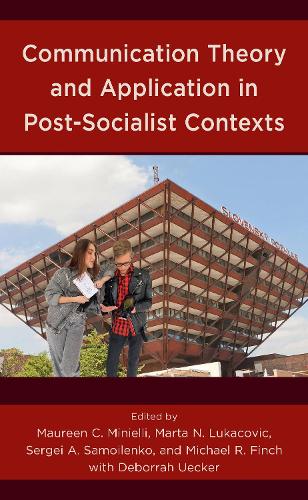
Communication Theory and Application in Post-Socialist Contexts
(Hardback)
Publishing Details
Communication Theory and Application in Post-Socialist Contexts
By (Author) Maureen C. Minielli
Edited by Marta N. Lukacovic
Edited by Sergei A. Samoilenko
Edited by Michael R. Finch
With Deborrah Uecker
Contributions by Olga Leontovich
Contributions by Ekaterina Bogomoletc
Contributions by Dmitrii Malkov
Contributions by Olga Pichugina
Contributions by Natalia Matveeva
Bloomsbury Publishing PLC
Lexington Books
14th March 2022
United States
Classifications
Professional and Scholarly
Non Fiction
History of other geographical groupings and regions or specific cultures / socie
003.54
Physical Properties
Hardback
302
Width 161mm, Height 238mm, Spine 25mm
676g
Description
While the broader field of communication studies is gaining more global prominence, this is an era when the underrepresented voices are fortunately becoming more recognized. Communication Theory and Application in Post-Socialist Contexts illustrates how Eurasia and Central and Eastern Europethe post-socialist regionrepresents a population of more than 400 million who embody a wide array of communication experiences. This book aims to capture significant communication tendencies in several post-socialist countries and situate these tendencies within communication theory and application. It contains the examples of theory-building and adaptation as well as applied projects implemented in national and local contexts. Only by inclusive incorporation of the underrepresented experiences in the fields discussions can the communication discipline continue to assert its relevance in and for the global community. This book serves as a resource for anyone on the quest of diversifying and globalizing communication studies.
Reviews
"These outstanding scholars skillfully illuminate the theory and application of communication scholarship in post-socialist contexts. The authors are well qualified for the task; each lives or has spent considerable time in Eastern Europe or former Soviet Union countries, actively teaching and researching communication. The well-researched and masterfully-written chapters are an invaluable resource for scholars, educators, and students who seek to understand the role of communication scholarship and instruction past and present in post-socialist contexts, cultures, and countries."
--Steven A. Beebe, Texas State UniversityThis volume represents a truly stimulating contribution to comparative communication studies. Illustrated with attractive cases, it brings much-needed insight into how different theories, concepts and methods, from framing and government communication to rhetorical analysis, are applied in post-socialist contexts. The exclusivity of this book is that it operates on three levels: it investigates how communication theories are applied in practice, how they are reinforced through scholarly research and how they are embedded in education. Most importantly, the book makes a strong case for better integration of post-socialist experiences in global communication research.
--Marijana Grbesa, University of ZagrebAuthor Bio
Maureen C. Minielli is professor (in memoriam) at CUNY-Kingsborough.
Marta N. Lukacovic is assistant professor of communication and mass media at Angelo State University.
Sergei A. Samoilenko is assistant professor in the Department of Communication at George Mason University.
Michael R. Finch is chair of the communication department at Bryan College and affiliate at LCC International University in Klaipeda, Lithuania.
Deborrah Uecker is emeriti professor of communication at Wisconsin Lutheran College.
